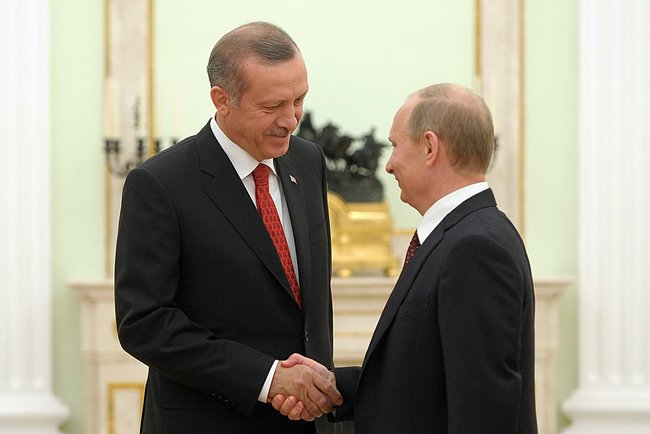Turkey needs to overhaul her Syrian politics after the Erdogan and Putin meeting

By Damien Dean
After the failed coup attempt, President Erdogan’s first visit was to St Petersburg and is a significant indicator of what comes next for the future of Syria. Mr Putin announced that he was one of the first leaders to reach out to Mr Erdogan, who requested the recovery of relations crumbled by the downing of Russian jets by dispatching an apologetic letter. Both leaders emphasized that the countries in the region have high expectations—though these expectations differ widely and wildly—from Turkey and Russia. “All but Syria” approach with Russia will evidently stymie the recent rapprochement between Russia and Turkey, a fact clear for everyone that without a solution on the status of Bashar Assad, the extent of cooperation will be limited, if not entirely nil.
Just a quick recap: Before the Syrian civil war erupted in 2011, the affectionate relations between Turkey and Syria was not a secret of any sort. This amiable wind spurred various political and economic initiatives to be taken between the two countries including the visa removal for Turkish and Syrian citizens. And due to this, trade was flourishing on both sides of the border. Mr Erdogan was indifferent to the type of regime in Syria. Apathy to the regime type in Syria was a part of Turkey’s “zero-problems with neighbours” policy, which was a stepping stone for Turkey to take a leadership position in the its immediate region as well as in the topography on which the Ottomans once stood. When articulating the vision of Turkey’s foreign policy, Mr Davutoglu, the craftsperson of this pro-active foreign policy called the strategic depth doctrine, was branding the term that will guide Turkey in her dealings with the world. According to this, Turkey has everything necessary to be a leader country thanks to her historical, cultural, and political affinity with the Muslim world, especially with the Middle East.
Soon after the protests began in Syria, Mr Erdogan kindly requested Assad to make reforms demanded by the Syrian people. When Assad proved himself to be a recalcitrant, Turkey then pushed for an election. This request, too, fell on deaf ears. As a last resort, Mr Erdogan started supporting the rebel groups while calling Assad with repulsive adjectives including murderer, terrorist, and villain to name but a few. Since then, the relations have been at odds.
Then came a major blow to the ambitious goals of Turkey in her Syria politics when Putin decided to back the Assad regime. Therefore, it is fair to infer that the nature of recent reconciliation between Russia and Turkey will be greatly affected by a political consensus for the future of Syria. Such consensus, however, seems to be underway in favour of Assad. True, ISIL is a common enemy of Turkey and Russia, and an increase in joint-efforts will indubitably take place after the Putin-Erdogan meeting. But Russia’s Syria still differs greatly from that of Turkey. Terminating the reign of the Assad regime by setting up a government that is friendly to her has been on Turkey’s agenda for a long time. But this possibility now seems so flimsy that Turkey will soon realize that it has to overhaul her Syrian politics, the result of which might be the full recovery of Assad in Syria.
The tone of relations with the US and the EU’s approach to Turkey in the coming days is going to play a vital role in reshaping Turkey’s Syrian policy. Feeling abandoned and betrayed, Mr Erdogan time and again expressed his disappointment towards the tepid reaction of the west to the coup attempt and stated that the US has to make a decision between Turkey and Fethullah Gulen, a statement later seconded by Bekir Bozdag, the minister of justice. Bozdag claimed that Gulen’s extradition is a matter of politics rather than law. Therefore, whichever way the US decides, it is going to shape Turkey’s relations with the US and thus with Syria.
If the US refuses to hand over Gulen to Turkey, this will complicate the situation in Syria further by pushing Turkey harder to the Russian side such that anti-western stance might emerge as common denominator for Russia, Turkey and Syria. And this is what Mr Putin may dream of because a Turkey with weak relations with the NATO might halt the NATO’s expansion efforts in the Caucasus and the Black Sea region.
PKK and YPG are snarled within the Syrian conundrum as well. Turkey will not be happy to see Russia and the US support YPG and PKK even in their fight against ISIL. Therefore, Turkey will be the only actor combatting the Kurds in Syria while trying to pull Russia and the US up to his side.
Yes, the fruits of Putin-Erdogan meeting are many: charters flights will be resumed, sanctions lifted, and cooperation in the energy sector tightened, but “all but Syria” approach is not a sustainable option for Turkey and Russia. The future of cooperation depends upon many variables that are beyond Turkey’s control. Amongst the variables, the Assad question stands out. Everyone in the region is now in a position to play one another against each other. Standing firm on this fine line will be a cumbersome endeavour.




